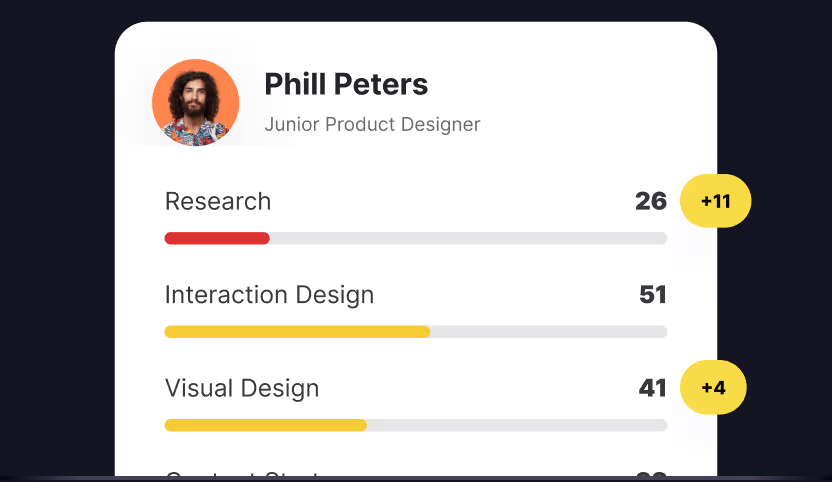My background
As a UI designer transitioning deeper into UX principles, I found myself at a crucial professional crossroads. While completing my master's degree in user accessibility, I recognized the need for a structured approach to validate and expand my design skills beyond academic theory. With years of design experience already under my belt, I needed a solution that would acknowledge my existing expertise while helping me fill knowledge gaps systematically.
My search for professional development began with evaluating educational platforms that could provide credible certification in UX/UI. After researching multiple options, including Interaction Design Foundation, I ultimately discovered Uxcel through recommendations from other design professionals I followed on LinkedIn.
In addition to being a learner, I’ve also taken part in Uxcel’s mentorship program, which has been an equally rewarding experience. The platform fosters a strong sense of community by allowing members, mentors, and instructors alike to post design projects for peer review. This system not only provides valuable opportunities for feedback at all levels of experience but also encourages meaningful knowledge sharing within the community. While I’ve published some of my own projects, I’ve also dedicated a lot of my time to reviewing others.
Because I learn so much from peer feedback myself, I try to engage deeply with each project, pointing out what I feel is done well while also detailing where I see opportunities for improvement, always explaining my reasoning thoroughly. On several occasions, designers reached out to show me their updated work after applying my feedback and asked for a second review. Seeing their growth and appreciation has made the mentorship experience both impactful and fulfilling.
My challenge
My professional development journey presented several significant obstacles:
- Traditional learning constraints: Conventional courses required dedicated computer time after already spending 8+ hours at work on screens
- Certification credibility: As a professional seeking to enhance visibility with recruiters, I needed legitimate credentials that industry peers would recognize
- Progress validation: Without measurable growth indicators, it was difficult to assess skill development and maintain motivation
- Practical application: Academic knowledge without practical application opportunities created a gap between learning and portfolio development
- Community connection: Working in a regional market (Spain/Portugal) created isolation from broader design community standards and feedback
The European job market presented additional challenges. Spanish companies were reluctant to invest in professional development or recognize certifications for advancement. This reality meant that any learning investment needed to deliver value beyond internal promotion opportunities, specifically enhancing my visibility to external opportunities and recruiters.
Finding my solution
My evaluation process began with the Uxcel free plan, focusing initially on accessibility courses. The platform immediately provided validation through skills assessment, confirming my existing knowledge while identifying specific growth areas.
I committed to the investment in my professional development. The decision was validated by several platform attributes that distinguished Uxcel from alternatives:
- Incremental learning structure: Lessons were organized into digestible segments that accommodated my schedule
- Interactive engagement: The quiz format and feedback mechanisms significantly enhanced knowledge retention
- Progress visualization: Clear metrics showed skill development over time, creating tangible evidence of growth
- Career path guidance: Structured learning recommendations aligned with my UI design focus
- Visual appeal: The platform's design resonated with my aesthetic sensibilities as a UI professional
The platform's mobile application proved transformative for my learning habits. I established a 6 PM daily alarm that prompted me to complete exercises during my commute home. This integration into my daily routine allowed me to advance my skills without sacrificing additional screen time after work hours.
Effect on my career
The structured learning approach yielded several significant professional outcomes:
- Professional certification: Successfully completed the UI designer certification in June 2023, coinciding with finishing my master's degree in user accessibility
- Community validation: Colleagues and professors acknowledged my certification achievements on LinkedIn, enhancing professional credibility
- Quantifiable skill development: The skills graph feature provided visual confirmation of progress over time, creating powerful motivation
- Portfolio expansion: Design briefs and challenges supplied practical applications and feedback for portfolio enhancement
- Professional visibility: Certifications improved profile visibility to recruiters and hiring managers
The platform's structured approach to skill development created a compelling narrative of continuous improvement. By archiving completed lessons and reviewing progress metrics, I could literally watch my professional capabilities evolve over the two-year period.
Most significantly, the certification experience transformed what could have been an obligatory professional development task into an engaging, gamified experience that I genuinely enjoyed. The achievement system converted learning from obligation to recreation while still delivering substantial professional value.
My experience with Uxcel revealed several key insights about effective professional development in the design field:
Visual progress metrics drive engagement: Seeing my skills graph evolve over time created powerful motivation. I sometimes go to the little animation to see progress, and I see the progress that I have done in the last two years, and I get so happy with myself because I can really feel that it made a difference.
Gamification transforms obligation into enjoyment: The points system, leaderboards, and achievement metrics created healthy engagement incentives. Unlike aggressive gamification systems that create anxiety, Uxcel's approach balances motivation with positive reinforcement.
Mobile accessibility enables consistent practice: By shifting learning to commute time via the mobile app, I eliminated the barrier of additional screen time after work. This integration into existing routines proved crucial for sustainable skill development.
Community feedback enhances growth: The constructive feedback system for design briefs created opportunities for meaningful peer learning. It is constructive feedback, and they are always on the lookout for people to be polite.
Certification creates professional visibility: While certifications did not directly translate to salary increases in my regional market, they significantly enhanced recruiter interest and professional networking opportunities.
The combination of these elements created what I describe as a sense that you are making some sort of upgrades to your skills, and you are betting on yourself. This investment mindset transformed education from expense to strategic career development.
Advice to other professionals
For designers considering professional development platforms, I emphasize several key considerations based on my experience:
1. Test before committing: The ability to try Uxcel's free version, including the first five lessons of each course, provides risk-free evaluation. If you do not know if you like it or not, just go log in, do the free version, and see if this is for you.
2. Seek progressive learning structures: The incremental approach with visible progress metrics creates sustainable motivation compared to monolithic courses.
3. Consider portfolio development needs: For job seekers facing lengthy search periods, structured design briefs with community feedback provide valuable portfolio content. If you need a design brief to do small projects to showcase in a portfolio, you can go to design briefs, make a little project, get feedback within the community, better it, and then put it on your portfolio.
4. Evaluate certification credibility: In a market flooded with boot camp graduates, a recognized certification can provide meaningful differentiation at a fraction of the cost.
When comparing Uxcel to traditional academic learning platforms, I found the visual appeal and interactive nature created a fundamentally different experience. This one feels more light... even though it does not reach an academic Harvard or university type of level, it does the same thing, but has a better visual feel to it that I really enjoy.
For design professionals navigating today's competitive market, finding sustainable, enjoyable methods of continuous skill development is essential. By transforming learning from obligation to achievement, Uxcel created a framework for ongoing professional growth that extends beyond immediate certification to lifelong learning habits.


